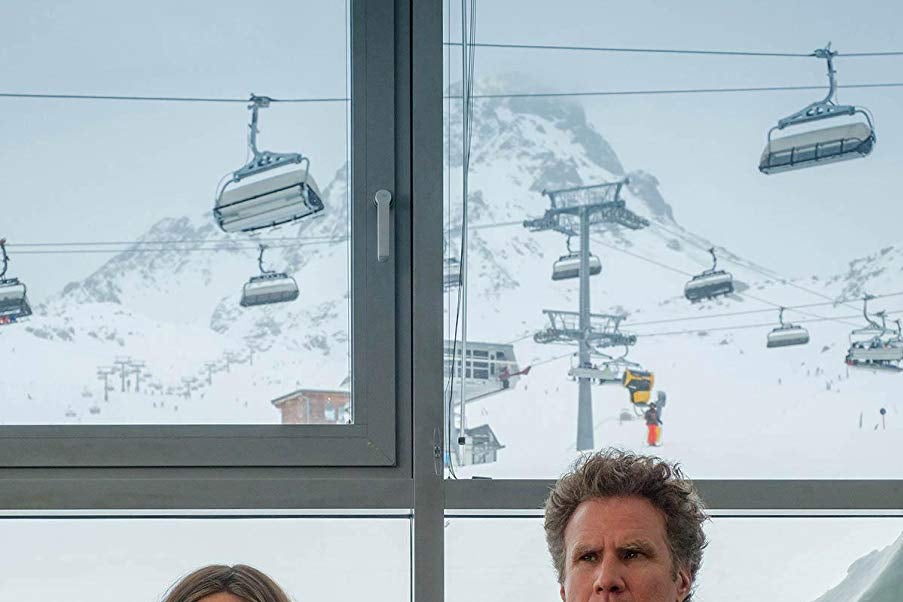“Tragedy,” Mel Brooks said, “is if I cut my finger. Comedy is if I walk in an open sewer and die.” In other words, whether something is funny or painful can be a matter of perspective. In adapting Ruben Östlund’s Swedish black comedy Force Majeure for an American audience, directors Nat Faxon and Jim Rash haven’t just translated the dialogue but shifted the focus, and in doing so they’ve changed it from a movie that is painfully funny to one that’s just painful. The premise remains the same (as do some of the shots): a husband and wife take their children on a ski vacation, where a pleasant lunch with a view of the slopes is disrupted by what seems to be an avalanche barreling right toward them. When the powder clears, everyone is unharmed, but the husband is nowhere to be found, having abandoned his family in a moment of lizard-brain panic. He then spends the rest of the movie trying to make up for it, his marriage and the respect of his children hanging by a steadily fraying thread.
Force Majeure centers on the husband, whose battered masculinity is inherently comic. But Downhill, the remake, shifts to the wife, here called Billie and played by Julia Louis-Dreyfus, and from her point of view, the discomfort is more likely to catch in your throat. It’s clear even before the avalanche that her marriage to Pete (Will Ferrell) is not in great shape. When they arrive at the alpine resort, which seems to be oriented primarily toward adult singles and couples without children, she’s already in a foul mood, and his response is to act as if they’re already having a great time in the hopes that it’ll eventually catch on. He’s determined that their vacation can be, or can at least look like, as much fun as the one his co-worker Zach (Zach Woods) and his Instagram-fluent girlfriend, Rosie (Zoë Chao), seem to be enjoying, captioned with things like “#noagenda.” (Billie suggests they use “hashtag #nohashtags.”) And when the reality falls short, he retreats into his smartphone, hiding out in the bathroom so that Billie won’t catch him sneaking screen time.
The avalanche cracks open the rift in Billie and Pete’s marriage, especially since he can’t even bring himself to admit what happened. Since confronting her husband is like punching gelatin, Billie marches the family down to the resort’s public safety office to register a protest. But the burly Viking who takes their complaint (Kristofer Hivju, who played Zach Woods’ role in Force Majeure) insists the terrifying experience was handled “perfectly,” and that Americans need to get over their instinct to threaten a lawsuit every time they bruise their shins. It’s one of the few times the movie brings the culture-clash element to the fore, and it ought to be a moment for the spouses to bond together, in nationalistic fervor if nothing else. But he backs down, leaving her alone yet again, her anger rising to fill the void of his silence.
Louis-Dreyfus was an executive producer of Downhill—which was written by Faxon and Rash as well as Succession creator Jesse Armstrong—and a driving force behind the remake, and it’s not hard to see what drew her to it. Simmering frustration is squarely in her wheelhouse, and she showed in Enough Said that given the canvas of a feature film, she can mix it with a steady stream of melancholy. But over the course of the movie, that stream turns to vinegar, and by the end, the bitterness is all you can taste. This isn’t a movie about two people who love each other experiencing a bump in the road. It’s a movie about people who should have split up long ago, bound together because starting over would be too much trouble. On a chairlift ride when it’s just the two of them, Rosie tells Billie that if her boyfriend did that to her, she would be gone in a flash, no questions asked and no waiting around for an apology. “How old are you?” Billie asks her, and Rosie responds, “30.” That’s the end of the conversation.
There’s a straight-ahead drama to be made from this situation (even if Julia Loktev’s The Loneliest Planet already did so), but Downhill too often plays like a cringe comedy that’s all cringe. It’s not just uncomfortable; it’s unpleasant. A movie that was even more squarely on Billie’s side might at least be able to generate some righteous anger, but every once in a while, this one drifts back to moping around with Pete, everyone hoping that he’ll finally rise to the occasion, until you start to feel that he’s wasting your life, too. Billie and Pete may be stuck with each other, but that’s no reason we have to hang around.
